- Home
- Jonathan Stroud
The Outlaws Scarlett and Browne Page 9
The Outlaws Scarlett and Browne Read online
Page 9
A little of the gloss had been taken off Albert’s excitement. He swallowed. “It sounds a slightly harsh philosophy.”
“Too right it is. And there’s a case in point.” She gestured beyond him.
Not far off, a grassy mound rose close beside the riverbank. On its top sat a scaffold of wooden poles, not unlike a giant picture frame. In its center hung a pale and irregularly shaped piece of cloth or canvas—pancake-colored and very weatherworn, with many odd holes and tears, lengths of stitching, and faint blue markings in places. It flapped in the breeze, and its shadow extended long across the river.
“That is a strange construction,” Albert said. “The canvas, with those marks…I feel it almost looks like—”
“Like human skin,” Scarlett said. “Yeah, because it is. Well, not exactly human—it’s stitched together from the skins of the Tainted. The ruling families skin the creatures and hang it up on boundaries as a deterrent. Encourages others of the breed to keep away. It’s an old one, this, by the looks. Even the tattoos have mostly faded now. But it does the job.”
Albert’s mouth hung open; for a moment, he couldn’t speak for horror. “That is a savage act. Can even the Tainted deserve such treatment?”
“You wouldn’t ask that if you’d seen them.”
“And you have?”
He felt a door slam shut in her mind. She had retreated to a deeper place. “If you ask me,” Scarlett said, “killing the Tainted is the only good thing the towns ever do. But we don’t want them to try the same with us, so we’d better spruce up, make sure the guards will let us in.”
From somewhere she produced a comb and began tugging at her hair. A crosswind blew. High on the mound, the ancient skin cracked and jerked, as if tearing free of its bonds.
* * *
—
The harbor of the town was a confusing series of wooden platforms and jetties, ladders and ramps, set beneath the high earth walls. It was a busy place, festooned with flags and bollards, and pressed about with vessels of many kinds—dhows with sharp sails, motorboats, fishing yachts, lumpen barges, even a primitive raft. Boatmen were carrying bags and baskets of fish, cloth, and other goods to and from the gate. High above, guards with rifles looked down from watchtowers. From somewhere came the rich, sad tolling of a bell.
They moored the rowboat and set off along the jetties toward the gate. At Scarlett’s insistence, Albert had combed his hair and brushed off the last remnants of river mud. She herself had located a glove from her rucksack and, gritting her teeth, had pulled it on to conceal her wounded hand. Her pain was clearly increasing; she was pale with strain and gray about the eyes. She paid little attention to the activity all around, but Albert was agog at the canvases and nets, the masts and hawsers, the whole bright, busy complexity of the scene. All the same, he eyed the throng of people with some nervousness. It was the first time he had been exposed to a crowd since his ride on the bus. And that hadn’t ended well.
They joined a queue funneling down an open stone passage to the river gate, where a small white guardhouse stood beside the path. Here some of the incomers were stopped and questioned, while most passed directly inside. And now, as Albert had feared, he became aware of a great and growing hubbub in his mind, a flash of unwelcome images, the buffeting of a dozen personalities close at hand. As on the bus, the tumult was discomforting, though at least here he wasn’t the center of attention. He sought to distract himself by tapping his foot, humming jauntily, whistling a cheery tune.
“What’s the matter with you?” Scarlett hissed. She had stepped close and gripped his arm. “You’re twitching like a madman! You know what they do to madmen? They chain them in the woods for the beasts to eat! Don’t draw attention to yourself! Do what I do.”
They had almost reached the guardhouse. Two iron doors hung open in the high earth ramparts, with a sunlit street shimmering beyond. The queue moved through at a decent pace—fishermen bearing swollen nets, a man wheeling a barrow, an old man carrying a child…
Scarlett swaggered forward as if she owned the place. In moments, she was in. Albert felt a surge of confidence. He started after her—
“Hey!”
A young, dark-skinned man sat at an open window in the guardhouse. He had his hand raised; a finger twitched and beckoned. Albert’s heart struck painfully against his rib cage. He halted.
“Yes, you. Boy with the ragged hair. Step over here.”
It was like Stonemoor all over again; being pulled out of the lineup, walking to the punishment room under the eyes of laughing warders…Albert shuffled to the window. The young man’s face was bland, his eyes coolly watchful. He wore a crisp white shirt, tightly filled with all relevant muscles, and a striped red-and-yellow tie. A coffee cup rested at his elbow, alongside several neatly stacked piles of papers. A rifle muzzle was visible, too, propped against the counter.
The man regarded him. “What’s your name, and what are you doing in Lechlade?”
It was not a difficult question, but Albert found he could not answer. An image flashed before his eyes—an image of himself, distorted and contemptible, as projected by the guardsman’s mind. And it was not quite right: his skin was paler, his features less regular and more brutish; it projected a certain shiftiness and depravity that Albert didn’t feel he actually possessed. It was not pleasant to see precisely what the young man thought of him. Albert flinched back as if he had been struck.
They chain them in the woods for the beasts to eat.
The guard’s eyes narrowed. “What’s your name, I said?”
“His name is Billy Johnson.” All at once, Scarlett was at his side. “He is my assistant,” she went on. “He is a little shy, as you can see, but harmless enough. We have traveled some days through the Wilds, and he is evidently struck dumb with delight to be here. Yes, Billy and I thank Jehovah, Allah, and dear Lord Brahma, among others, that we have come safely to Lechlade.” She nudged Albert sharply with an elbow. “Don’t we?”
“Yes,” Albert said.
The guard tapped a pen against his teeth and studied Scarlett. The image in Albert’s mind changed; the distorted version of himself was gone. The guard’s perception of Scarlett, which replaced it, was more or less accurate, with certain attributes perhaps overemphasized a little. It was certainly less hostile than his response to Albert had been.
“He have any bodily defects?” he asked.
“No,” Scarlett said. “Nor mental ones, despite appearances.” She winked at him.
“And what is your name, miss?”
“Alice Cardew.”
The guard took up his pen and made a note on a form. “Wessex name, is that?”
“Yes, sir. Wessex born and bred I am, out Malmesbury way. My dear old dad’s family’s been there time out of mind.”
She was beaming now. It struck Albert how all the pain and weariness had seemingly fallen away from her. Her green eyes sparkled; she radiated trustworthiness and health.
“What is your occupation?”
Scarlett leaned forward confidingly. “I’m so glad you asked me that. I am a supplier of holy relics.”
The man sat a little straighter in his seat. “Holy relics?”
“Yes indeed.” Scarlett reached into a pouch in her coat, brought out several small, clear plastic boxes containing items nested on cotton wool. “I sell fragments taken at great personal risk from the sacred sites of the Seven Kingdoms. Do you see this shard of ruby glass? It comes from the otter-haunted ruins of Ely Cathedral in the Anglian fens. These square blue tiles? Genuine faience, retrieved from the Drowned Mosque of Bristol, five fathoms down. Ah, but I see you are interested in this small but remarkable set of bones…. Yes, you have excellent judgment. This is none other than the right big toe of Saint Silas, the Kentish hermit, the very toe with which he healed the moneylender.” Scarlett moved the boxes on the co
untertop in such a way that the shiny plastic sparkled in the sun. “Of course, such items have miraculous powers. Yet they are all available for purchase, or can be touched, kissed, or fondled for a lesser sum.”
The young man made an involuntary movement of his hand toward the boxes. He controlled himself and frowned. “It is easy to claim miracles. Do you have proof of this?”
Scarlett gestured expansively. “The evidence is here before you! Have we not just rowed across the Wilds entirely unmolested? In any case, to express my thanks for our safe arrival, you may if you wish take the saint’s toe bones as a token of my gratitude.”
The man’s thoughts were no longer directed toward Scarlett or Albert; instead, they had devolved into a fog of avarice and mystical joy. His expression did not change, but by faint relaxations of his body, Albert knew that Scarlett had done it, and they were in. The guard glanced at his form. “Thank you very much, miss,” he said. “Just a couple of formalities. Have you ever come into contact with the Tainted?”
“No.”
“Have you ever been to the Burning Regions?”
“No.”
“Are you an anarchist, an agitator, or an agent for Wales, Anglia, or the Cornish State?”
Scarlett’s smile was relaxed and indulgent. “No, sir. I’m none of those.”
The guard sat back, ticked some boxes, marked the paper with an outsize ink stamp, and pocketed the toe bones. “Welcome to Lechlade, Miss Cardew. Enjoy your stay.”
So it was done. As in a dream, Albert felt Scarlett take his arm. They passed between the river gates—two towering slabs of wrought black metal, of proven resistance to claw, tooth, and fang—and beneath an arch of grim gray stone. He could hear the murmur of human voices and songbirds trilling. Beyond was a green and sunlit space. He walked on and into it. And so, for the first time in his memory, and despite the efforts of the warders at Stonemoor, who had sacrificed their lives attempting to prevent just such a moment as this, Albert Browne entered a Surviving Town.
The settlement of Lechlade occupied a roughly oval site on level ground, overlooking the confluence of the ancient rivers Thames and Coln. It was surrounded by a patchwork quilt of fields that stretched across twenty-five square miles of good, uncontaminated country. A black Tarmac road ran like an arrow from the land gate toward the circle of distant woods and marshes, linking the town to communities in Wessex, Mercia, and beyond. Lechlade’s main contributions to this trade network were wool, mutton, and leather goods. Its slave market, though small, was famous for its quantity of healthy children, mostly taken from raids on the borders of Wales. Its Faith House maintained high standards of decency and order. A rota system ensured that everyone—even members of the ruling families—served in turn at the guard towers, keeping an eye on the forest. They watched for the Tainted, for wild beasts, for bands of roving Welshmen, for outlaws…Who knew what danger might steal next out of the wilderness and wreak havoc in the town?
Within moments of his arrival on the high street, unhindered and unnoticed, Albert Browne had been left alone.
“Here’s a pound note,” Scarlett said. “If you’re hungry, buy food. But otherwise don’t talk to anyone. That’s the absolute rule. Each town has its own laws; they’re always slightly different. Not walking on the grass, not standing up when a Mentor passes…it might be anything. In Swindon, if you pick your nose in public, they lock you in the can. Watch what everyone else does, and copy them. And for the gods’ sake, don’t get into unnecessary conversations. That’s not your thing at all. Wait on that bench, see, between the punishment cages and the butcher’s shop. I’ll be back by nightfall, once I’ve fixed my hand.” She glared at him. “Then you and I have unfinished business to discuss.”
Albert felt a soft jab inside his chest. “I know it. You are talking of our parting ways. That was our agreement, when we got safely to a town.”
“It surely was. But before we do that, I need some answers from you, pal.” She held up her stiff gloved hand, the caked blood just visible on her wrist. “I want a proper explanation as to why this happened to me.”
With that, she turned and was gone into the crowd.
Albert remained on the sidewalk, a crumpled pound note between his fingers. He didn’t know what to do. His encounter with the guard had unsettled him, and Scarlett’s warnings about the people of the town were preying on his mind. It was hardly to be expected that Dr. Calloway’s men would have yet caught up with him, but evidently Lechlade was not somewhere he could properly relax. At least, not alone. With Scarlett alongside, it might be different.
Quite suddenly, he realized his companion’s departure had left a hole inside him.
Still, he was in a town at last—and it was full of wonders. He stood beside a Tarmacked turning circle, fringed by bright green lawns, where freight brought in by river was being transferred to rickshaws and petrol-powered trucks. Ahead of him, a broad street curved away, its houses low, two-storied, with steep red roofs and plump bay-windowed frontages that twinkled in the afternoon sun. In the angled golden light, Albert could see a butcher’s, a greengrocer’s, a bakery, a hat shop, and many other marvels fading off into the haze. Functioning streetlights, ready for evening, rose from clean, swept sidewalks; they were decorated with hanging baskets of pink flowers.
Near the butcher’s was a neat red postbox, and also a public fountain, where a small boy in somewhat drab gray clothes was taking a drink, a broom propped on the bench beside him. More disconcertingly, three splaying steel posts rose here too. There was a cage dangling between them, some ten feet off the ground. The sun was shining directly behind it, so it was impossible to make out the details of the rather thin person slumped inside. No one else was paying the cage any attention. Remembering Scarlett’s advice about fitting in, Albert reluctantly looked away.
Without definite purpose, he started walking slowly up the road, being careful not to bump into any of the people in the crowd. There were so many of them! So many shades and colors, laughing, talking, flowing in and out of the shops like a flood tide. There were women in jeans and colored blouses, bowler-hatted gentlemen, healthy-looking boys and girls. Proper living people, with no obvious physical deformities. So different from his fellow guests at Stonemoor, who scarcely did anything but groan and screech from sunup to curfew. The citizens of Lechlade had a vitality that enthralled Albert—and unnerved him a little too. He sensed their thoughts jostling each other in the space around him, the images merging, colliding, distorting…It would have been madness to focus on them; his mind would have been stretched in a dozen directions at once. To escape the temptation, he ducked into the baker’s shop, where, to his delight, he succeeded in buying an iced cherry cake and a bag of licorice. Cake was not something that was on offer in Stonemoor, and its sweetness was a revelation. Cradling it close, tearing off chunks and stuffing them into his mouth, he continued along the road.
A short way farther on he came to an impressive pillared building, which proved to be the Lechlade Municipal Bank. A languorous mustachioed gentleman with a sharp-shouldered suit and slouched gun belt stood outside its tall glass doors, watching customers come and go. His thoughts seemed to focus mainly on alcohol; those of the customers, as so often in the outside world, revolved around money. Neither subject interested Albert, who was growing weary from keeping his perceptions under control. Seeking a place away from the crowds, he crossed the road and entered a small park, a place of paths and manicured lawns set amongst green trees.
An old lady was sitting on a bench, reading a newssheet in the late-afternoon sun. She was a somewhat portly pink-skinned person in a dark blue jacket and gray skirt. She glanced at Albert with small bright eyes as he perched himself beside her.
Albert offered her the paper bag. “Would you like some licorice?”
“No, thanks. It gives me wind.”
Albert withdrew the bag. He took a piece him
self and sucked it somewhat cautiously. They sat in silence awhile more. The lady’s thoughts were quiet and fleeting and dissipated swiftly on the air. Albert did not seek to sieve them. He was tired.
At last the woman put down the sheet. “That’s my day’s entertainment over. Have you read the news?”
“Not yet.”
The lady nodded. “Well, you haven’t missed much. There has been an atrocity at Cricklade, where a woman working in the fields was taken by the Tainted, dragged into a ditch, and devoured. Severe electrical storms have damaged towns in Northumbria. An unknown female outlaw, uncouth and redheaded, has robbed the bank at Cheltenham. And one of the Great Ruins has collapsed into the center of the London Lagoon, causing a tsunami that washed away a village on the shore. Mind you, that last one happened a month back. It has taken this long for word to reach us, so I wouldn’t say it was exactly ‘new.’ ”
“It is interesting to hear it, anyway,” Albert said softly. London! He felt a fizz of longing at the mention of the name. London! The Free Isles! Ah, that was his dream. But they were so far away…. He gazed wistfully at the dappled sunlight in the trees. “This is a nice place,” he said.

 The Leap
The Leap Buried Fire
Buried Fire Heroes of the Valley
Heroes of the Valley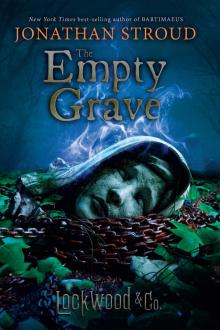 The Empty Grave
The Empty Grave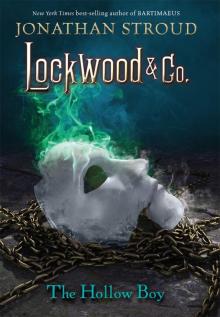 The Hollow Boy
The Hollow Boy The Last Siege
The Last Siege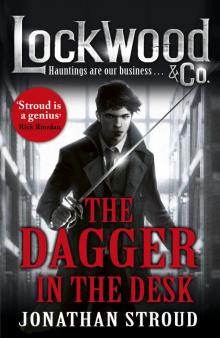 The Dagger in the Desk
The Dagger in the Desk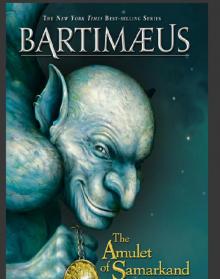 The Amulet of Samarkand
The Amulet of Samarkand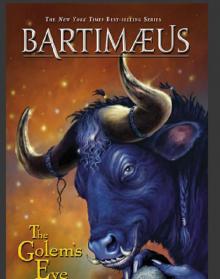 The Golem's Eye
The Golem's Eye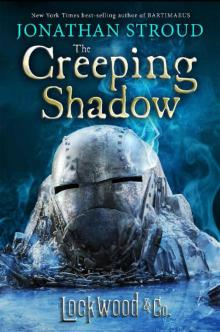 The Screaming Staircase
The Screaming Staircase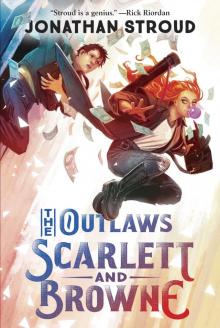 The Outlaws Scarlett and Browne
The Outlaws Scarlett and Browne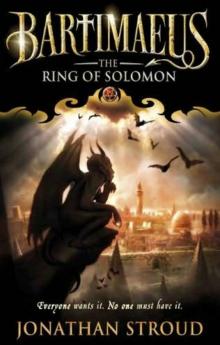 The Ring of Solomon: A Bartimaeus Novel
The Ring of Solomon: A Bartimaeus Novel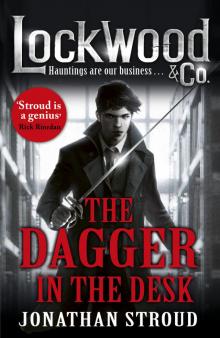 Lockwood & Co
Lockwood & Co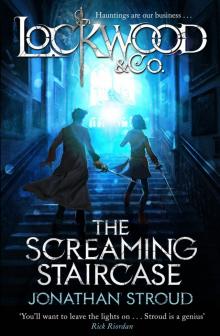 Lockwood & Co: The Screaming Staircase
Lockwood & Co: The Screaming Staircase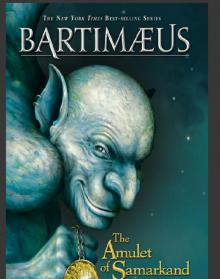 Bartimaeus: The Amulet of Samarkand
Bartimaeus: The Amulet of Samarkand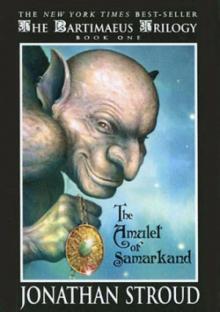 The Amulet of Samarkand tbt-1
The Amulet of Samarkand tbt-1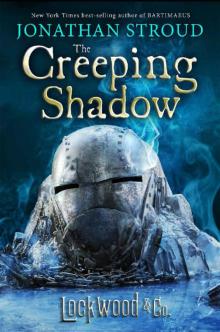 Lockwood & Co.: The Creeping Shadow
Lockwood & Co.: The Creeping Shadow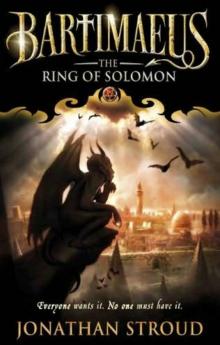 The Ring of Solomon
The Ring of Solomon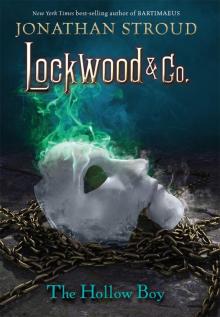 Lockwood & Co. Book Three: The Hollow Boy
Lockwood & Co. Book Three: The Hollow Boy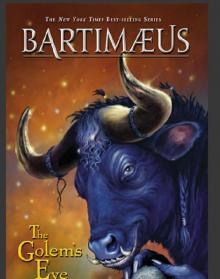 Bartimaeus: The Golem’s Eye
Bartimaeus: The Golem’s Eye